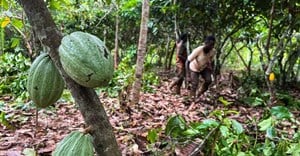Pioneering sustainable forestry towards a circular economy

In Africa, sustainable forestry practices have the potential to promote circular economies by ensuring that resources are managed in a way that maximises their ecological, social, and economic benefits while minimising waste and negative environmental impacts.
According to Earth.Org, 26% of Africa’s land is occupied by forests which are home to some 43 billion trees. But nearly 4 million hectares of these forests are being cut down each year, at almost double the speed of the world’s deforestation average. While deforestation has decreased globally in recent years, the rate of loss of forest area in Africa has increased steadily since 1990, weakening the ability of the continent’s ecosystem to withstand climate change.
Here in South Africa, the situation is not much different. Findings by Global Forest Watch show that from 2001 to 2020, South Africa lost almost 1.5 million hectares of tree cover, equivalent to a 25% decrease since the start of the century.
But there is potential for change in the country and across the continent.
Rebuilding healthy ecosystems
Africa contains more restorable lands than any other part of the Earth – giving us the opportunity to spearhead global initiatives to rebuild healthy ecosystems and offset carbon emissions. Our forests play a critical role in sustainable development, from combating soil erosion in agricultural fields to mitigating the effects of climate change. Importantly, too, South Africa’s rich biodiversity and forestry landscapes are inextricably connected to socioeconomic development, especially in adjacent rural communities.
These communities largely benefit directly through employment opportunities, supply of firewood and charcoal, access to grazing, and harvesting of non-wood products. It is for these reasons that the sustainable management of forests and trees becomes imperative so that these communities can continuously enjoy the benefits that are directly or indirectly derived from such ecosystems.
This means refocusing on the utilisation, management and conservation of our forest resources in a manner that ensures the ecological, cultural, social, and economic integrity of the ecosystem. We also need to drive inclusivity in the use and management of forests and forest-based enterprises. In this regard, forest-adjacent communities can be key partners in resource monitoring, fire prevention and control, tree planting, and tree plantation maintenance.
Role of the private sector
The private sector has a huge role to play in this regard, and companies which rely on forest resources are taking action to go beyond eliminating negative impacts and grow their positive impacts beyond the boundary of their business. CHEP, a global logistics and supply chain solutions company, is pioneering a regenerative concept focused on restoring, replenishing, and then creating more value or capital for society and the environment than the business takes out.
CHEP Sub-Saharan Africa (SSA) has a forestry portfolio of 18 pine-timber farms in South Africa covering an area in excess of 7,500ha of standing pine plantations. With timber being an integral part of its operations, the company has embraced forest-positive goals as part of its 2025 Global Sustainability Targets, enabling the sustainable growth of two trees for every tree that is used, one tree for the pallet and the other for the planet.
Third-party life cycle analysis (LCA) has shown that CHEP pallets use 3.5 times less wood, generate 2.5 times less waste, and emit 2.3 times less CO2, compared with the main market alternative. Another noteworthy contribution from CHEP-owned plantations is the effect it has on surrounding communities. Employment opportunities are created for the locals on the CHEP farms as well as the opportunity to harvest reeds on the farms for the manufacture of reed mats. Alien timber is also supplied to the surrounding communities to be used as firewood.
Sustainable economic development
Sustainable forestry practices like these help to ensure that the resources necessary for a circular economy are available both now and in the future.
By conserving forests, minimising waste, and promoting the use of renewable resources, sustainable forestry practices help to ensure that forest-based industries can contribute to sustainable economic development while preserving natural resources for future generations.
























